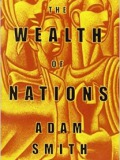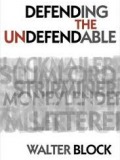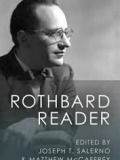Book

The Politically Incorrect Guide to American History
Claiming that most textbooks and popular history books were written by biased left-wing writers and scholars, historian Thomas Woods offers this guide as an alternative to "the stale and predictable platitudes of mainstream
aboutLiberty Portal
Liberty Portal is a gateway for free markets and free thinking. We aggregate open-sourced content to promote and popularize important lessons from economics, philosophy, history and more.
suggested
Adam Smith
The Wealth Of Nations

It is symbolic that Adam Smith’s masterpiece of economic analysis, The Wealth of Nations, was first published in 1776, the same year as the Declaration of Independence.
In his book, Smith fervently extolled the simple yet enlightened notion that individuals are fully capable of setting and regulating prices for their own goods and services. He argued passionately in favor of free trade, yet stood up for the little guy. The Wealth of Nationsprovided the first--and still the most eloquent--integrated description of the workings of a market economy.
The result of Smith’s efforts is a witty, highly readable work of genius filled with prescient theories that form the basis of a thriving capitalist system. This unabridged edition offers the modern reader a fresh look at a timeless and seminal work that revolutionized the way governments and individuals view the creation and dispersion of wealth--and that continues to influence our economy right up to the present day.
Read moreIn his book, Smith fervently extolled the simple yet enlightened notion that individuals are fully capable of setting and regulating prices for their own goods and services. He argued passionately in favor of free trade, yet stood up for the little guy. The Wealth of Nationsprovided the first--and still the most eloquent--integrated description of the workings of a market economy.
The result of Smith’s efforts is a witty, highly readable work of genius filled with prescient theories that form the basis of a thriving capitalist system. This unabridged edition offers the modern reader a fresh look at a timeless and seminal work that revolutionized the way governments and individuals view the creation and dispersion of wealth--and that continues to influence our economy right up to the present day.
Walter Block
Defending The Undefendable

Professor Block's book is in a new edition from the Mises Institute, completely reset and beautifully laid out in an edition worthy of its contents.
It is among the most famous of the great defenses of victimless crimes and controversial economic practices, from profiteering and gouging to bribery and blackmail. However, beneath the surface, this book is also an outstanding work of microeconomic theory that explains the workings of economic forces in everyday events and affairs.
Murray Rothbard explains why:
"Defending the Undefendable performs the service of highlighting, the fullest and starkest terms, the essential nature of the productive services performed by all people in the free market. By taking the most extreme examples and showing how the Smithian principles work even in these cases, the book does far more to demonstrate the workability and morality of the free market than a dozen sober tomes on more respectable industries and activities. By testing and proving the extreme cases, he all the more illustrates and vindicates the theory."
F.A. Hayek agreed, writing the author as follows: "Looking through Defending the Undefendable made me feel that I was once more exposed to the shock therapy by which, more than fifty years ago, the late Ludwig von Mises converted me to a consistent free market position. … Some may find it too strong a medicine, but it will still do them good even if they hate it. A real understanding of economics demands that one disabuses oneself of many dear prejudices and illusions. Popular fallacies in economic frequently express themselves in unfounded prejudices against other occupations, and showing the falsity of these stereotypes you are doing a real services, although you will not make yourself more popular with the majority."
Read moreIt is among the most famous of the great defenses of victimless crimes and controversial economic practices, from profiteering and gouging to bribery and blackmail. However, beneath the surface, this book is also an outstanding work of microeconomic theory that explains the workings of economic forces in everyday events and affairs.
Murray Rothbard explains why:
"Defending the Undefendable performs the service of highlighting, the fullest and starkest terms, the essential nature of the productive services performed by all people in the free market. By taking the most extreme examples and showing how the Smithian principles work even in these cases, the book does far more to demonstrate the workability and morality of the free market than a dozen sober tomes on more respectable industries and activities. By testing and proving the extreme cases, he all the more illustrates and vindicates the theory."
F.A. Hayek agreed, writing the author as follows: "Looking through Defending the Undefendable made me feel that I was once more exposed to the shock therapy by which, more than fifty years ago, the late Ludwig von Mises converted me to a consistent free market position. … Some may find it too strong a medicine, but it will still do them good even if they hate it. A real understanding of economics demands that one disabuses oneself of many dear prejudices and illusions. Popular fallacies in economic frequently express themselves in unfounded prejudices against other occupations, and showing the falsity of these stereotypes you are doing a real services, although you will not make yourself more popular with the majority."
Murray Rothbard
The Rothbard Reader

Few economists manage to produce a body of work that boasts a serious following twenty years after their deaths. Murray N. Rothbard is a rare exception. More than two decades since his passing, his influence lives on, both in the work of a new generation of social scientists, and among a growing number of the general public.
One reason for Rothbard’s continuing popularity is his ability to reach across disciplines, and to connect them: unlike many contemporary economists, who specialize in increasingly narrow fields within the science, Rothbard’s research agenda was expansive and interdisciplinary, covering most of the social sciences and humanities.
Some readers of this book will already be familiar with Rothbard’s major works, such as his path-breaking treatise on economics, Man, Economy, and State. Yet Rothbard also produced hundreds of shorter works for both academic and popular audiences. Unfortunately, many lack the time to explore his writings; what’s more, his oeuvre is so enormous it is often difficult to know where to begin.
This book aims to solve these problems by providing a window into Rothbard’s achievements in the social sciences, humanities, and beyond. It includes introductory, intermediate, and advanced material, to ensure the book can be enjoyed by readers of all levels of understanding and familiarity with Rothbard’s work. Therefore although it is intended primarily for newcomers, veteran readers will also find much to discover or re-discover in these pages.
The individual articles in this collection can be read in any order; with that in mind, we propose two ways to explore them. Those new to Rothbard’s writing may want to begin with the shorter, more accessible chapters that interest them most, before continuing on to more difficult topics. However, we have intentionally arranged the articles and sections so that readers who prefer a systematic discussion, or who are already acquainted with Rothbard’s ideas, can read the book cover to cover.
The volume begins with a personal look at Rothbard’s life and work, as told in his own words. The opening section, “Rothbard: Man, Economist, and Anti-Statist,” brings together three rare interviews, each highlighting different aspects of his unique personality and worldview. Readers will soon recognize an overarching theme running through Rothbard’s life and work: a passion for liberty, a unifying principle in his thought, no matter the discipline.
This commitment can be seen further in the next section, “Foundations of Social Science and the Free Society.” In the first essay, Rothbard stresses “The Discipline of Liberty” as the foundation for the study of humanity. This central interest serves as inspiration and foundation for the project that follows, namely, an outline of the human sciences and their primary method of investigation: praxeology.
Although Rothbard wrote on many subjects, his training—and heart—were in economics, and so too are the majority of the writings in this collection. The next two sections provide a concise exposition of economic theory, beginning with individual value and choice. They explore in turn Rothbard’s insights into the “Principles of Economics and Government Intervention” and “Money, Banking, and the Business Cycle.” Together, these chapters provide a brief overview of Rothbard’s more comprehensive account of economic theory in Man, Economy, and State.
Austrian economists have always been fascinated by the history of their science, and Rothbard was no exception. In fact, his writings on the subject are among his most original and controversial. The section devoted to the “History of Economic Thought” surveys the contributions of many influential economists, outlining the development of economics from mercantilism to the modern Austrian school.
However, Rothbard’s historical interests extended far beyond the history of economic doctrines. The section on “Economic History” illustrates how he consistently a
Read moreOne reason for Rothbard’s continuing popularity is his ability to reach across disciplines, and to connect them: unlike many contemporary economists, who specialize in increasingly narrow fields within the science, Rothbard’s research agenda was expansive and interdisciplinary, covering most of the social sciences and humanities.
Some readers of this book will already be familiar with Rothbard’s major works, such as his path-breaking treatise on economics, Man, Economy, and State. Yet Rothbard also produced hundreds of shorter works for both academic and popular audiences. Unfortunately, many lack the time to explore his writings; what’s more, his oeuvre is so enormous it is often difficult to know where to begin.
This book aims to solve these problems by providing a window into Rothbard’s achievements in the social sciences, humanities, and beyond. It includes introductory, intermediate, and advanced material, to ensure the book can be enjoyed by readers of all levels of understanding and familiarity with Rothbard’s work. Therefore although it is intended primarily for newcomers, veteran readers will also find much to discover or re-discover in these pages.
The individual articles in this collection can be read in any order; with that in mind, we propose two ways to explore them. Those new to Rothbard’s writing may want to begin with the shorter, more accessible chapters that interest them most, before continuing on to more difficult topics. However, we have intentionally arranged the articles and sections so that readers who prefer a systematic discussion, or who are already acquainted with Rothbard’s ideas, can read the book cover to cover.
The volume begins with a personal look at Rothbard’s life and work, as told in his own words. The opening section, “Rothbard: Man, Economist, and Anti-Statist,” brings together three rare interviews, each highlighting different aspects of his unique personality and worldview. Readers will soon recognize an overarching theme running through Rothbard’s life and work: a passion for liberty, a unifying principle in his thought, no matter the discipline.
This commitment can be seen further in the next section, “Foundations of Social Science and the Free Society.” In the first essay, Rothbard stresses “The Discipline of Liberty” as the foundation for the study of humanity. This central interest serves as inspiration and foundation for the project that follows, namely, an outline of the human sciences and their primary method of investigation: praxeology.
Although Rothbard wrote on many subjects, his training—and heart—were in economics, and so too are the majority of the writings in this collection. The next two sections provide a concise exposition of economic theory, beginning with individual value and choice. They explore in turn Rothbard’s insights into the “Principles of Economics and Government Intervention” and “Money, Banking, and the Business Cycle.” Together, these chapters provide a brief overview of Rothbard’s more comprehensive account of economic theory in Man, Economy, and State.
Austrian economists have always been fascinated by the history of their science, and Rothbard was no exception. In fact, his writings on the subject are among his most original and controversial. The section devoted to the “History of Economic Thought” surveys the contributions of many influential economists, outlining the development of economics from mercantilism to the modern Austrian school.
However, Rothbard’s historical interests extended far beyond the history of economic doctrines. The section on “Economic History” illustrates how he consistently a
support
If you like what we do and want to support us, then you are a fine humanitarian. Click the link below to find out more.
Support the liberty movement
Become a contributor
Want to join the fight and publish your content here? Email us at team at libertyportal dot com!
Collaborate with Liberty Portal
